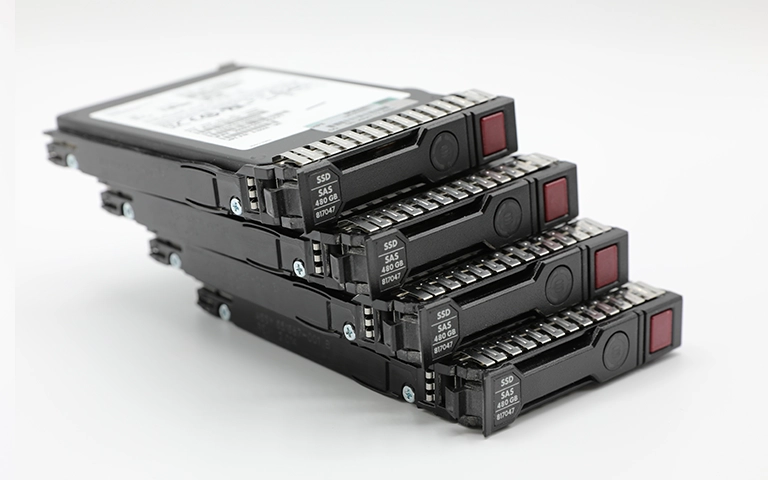Why Server Cloud Backup Matters
Modern businesses depend on uninterrupted access to their data. A single server outage, ransomware incident or accidental deletion can trigger costly downtime and disrupt day-to-day operations.
Server cloud backup provides a secure, automated layer of protection. It stores up-to-date copies of your data off-site and synchronises them in real time, allowing rapid recovery if a fault occurs.
If your organisation needs dependable data protection or expert assistance with its current backup setup, RAID Recovery Services can help you safeguard critical information and maintain business continuity.

What Is Server Cloud Backup?
Server cloud backup refers to copying and storing business data on secure remote servers via an internet connection. Instead of relying solely on on-premise drives or physical tapes, files are transmitted over encrypted channels and saved in the cloud.
These backups are automated, encrypted, and accessible from authorised devices. This means that even if a local server fails, your information remains protected and recoverable.
Compared with traditional backup methods, cloud solutions provide greater flexibility, scalability, and faster data restoration. They are particularly effective for organisations that require continuous protection and minimal operational downtime.
To better understand how cloud backup differs from conventional storage, read our guide on RAID vs Backup.
Can You Back Up a Server to the Cloud?
Yes. Almost any server, whether running Windows, Linux or a virtualised environment, can be backed up to the cloud. Cloud platforms allow businesses to set up secure backup routines that automatically copy and synchronise server data to remote storage.
However, proper setup involves more than simply uploading files. Encryption, access permissions and scheduling must be correctly configured to ensure consistent and compliant data protection. Incorrect settings can cause incomplete backups or create security gaps that expose sensitive data.
For smaller teams, manual setup might work for a while, but growing organisations benefit from professionally managed backups with continuous monitoring and verification. A correctly configured system provides reliable recovery when downtime or data loss occurs.
To see how cloud backups fit into your overall IT framework, explore our article on Servers for Business.

How Server Cloud Backup Works
Server cloud backup operates through an automated process that keeps your data secure and continuously updated.
Data Encryption: Before transfer, files are encrypted to protect them from unauthorised access.
Secure Transfer: Data is sent over a protected internet connection to a remote storage server.
Redundant Storage: The cloud provider stores multiple copies of your data across different servers, ensuring durability and reliability.
Incremental Updates: After the initial backup, only new or modified files are uploaded, reducing bandwidth use and storage demand.
Quick Restoration: In the event of data loss or a system issue, files can be restored directly from the cloud to your server or another authorised device.
This process reduces manual intervention while keeping your backups secure and up to date. For more information about remote storage methods, see our post on Tape Backup for Business.
Benefits of Using Cloud Backup for Servers
A well-planned cloud backup strategy provides several benefits that help organisations stay secure and maintain operational stability.
Continuous Data Protection: Automated backups run on a set schedule, reducing human error and lowering the risk of data loss.
Scalability: Cloud storage expands with your business requirements, removing the need to invest in additional on-site hardware.
Disaster Recovery: Even if physical servers are damaged, data remains secure in the cloud and can be restored promptly.
Remote Accessibility: Authorised users can access and recover files from any location with an internet connection.
Cost Efficiency: Cloud-based systems eliminate the need for large infrastructure purchases and ongoing maintenance costs.
By adopting these measures, your organisation gains flexibility, resilience and confidence in data availability. To see how this approach strengthens business continuity, read our guide on Business Data Recovery.

When Cloud Backup Is Not Enough
While cloud backups provide strong protection, they are not infallible. Data stored in the cloud can still become corrupted, overwritten or inaccessible if synchronisation fails or malware spreads before the backup completes.
Hardware issues within cloud infrastructure, accidental deletions or encryption faults can also compromise recovery. In such cases, even a reliable cloud backup may not restore every file correctly.
This is why having a verified recovery plan is just as critical as creating backups. Regular testing confirms that your copies are both functional and restorable when needed.
If a backup fails or key data becomes unreadable, professional recovery support may be necessary. For more detail on why backup and recovery are separate processes, see our article RAID Is Not Backup.
Fast turnaround times for business-critical data
How RAID Recovery Services Can Help
Even with a carefully designed backup strategy, data loss can still occur. When cloud or on-site backups fail, RAID Recovery Services provides professional solutions to recover vital business data.
Our engineers specialise in retrieving files from failed RAID arrays, corrupted cloud environments and hybrid infrastructures. Through advanced imaging and verification processes, we reconstruct file structures while maintaining full data integrity and confidentiality.
We perform recovery across complex systems including physical servers, virtual machines and network-attached storage. Each case is assessed individually to ensure the safest and most effective recovery plan.
If your organisation cannot access data from a failed backup or damaged server, RAID Recovery Services is ready to help you restore operations efficiently and securely. Learn more about similar cases in our post on Server Crash Recovery.

Trust the experts with proven results
Frequently Asked Questions
What is the main purpose of server cloud backup?
The main purpose is to store secure copies of your essential business data in the cloud, ensuring it can be restored quickly after hardware failure, cyberattack or accidental deletion.
How often should I back up my server to the cloud?
Backup frequency depends on how often your data changes. Most organisations schedule automated backups daily or hourly to keep information up to date.
Is cloud backup safer than local backup?
Cloud backups generally offer stronger protection because they are off-site, encrypted and supported by redundancy. Local backups remain valuable for faster on-site recovery during emergencies.
Can I recover individual files from a server cloud backup?
Yes. Most cloud platforms support file-level recovery, allowing you to restore selected folders or documents without performing a full system restore.
What should I do if my cloud backup fails?
Avoid manual recovery attempts that could cause further corruption. Contact a professional recovery provider such as RAID Recovery Services for secure assessment and reliable data restoration.